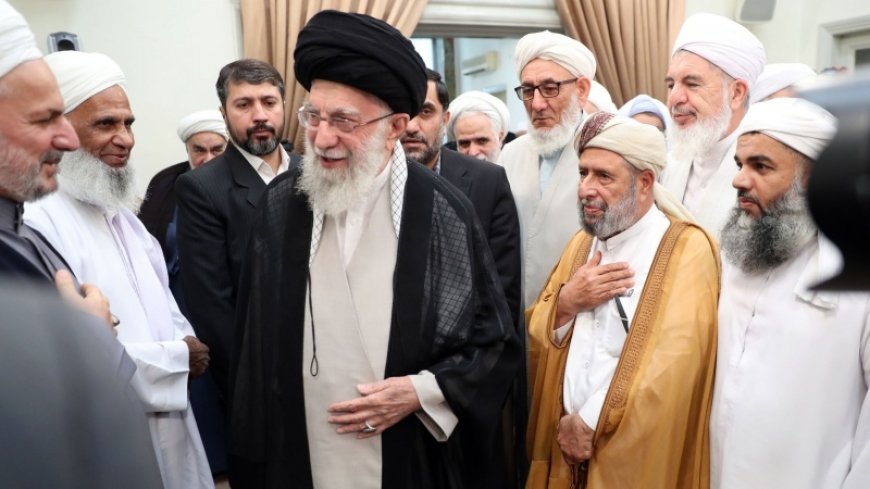Ayatollah Khamenei in a meeting with the Sunni religious scholars of Iran: Protecting the identity of the Islamic Ummah, a necessary issue
Ayatollah Khamenei, in a meeting with scholars and imams of Friday prayers and directors of Sunni religious schools across Iran, called it necessary to protect the precious identity of the Islamic Ummah and emphasized the importance of Islamic unity in the face of the efforts of those who want to harm this Ummah, while he said: "The issue of the Islamic Ummah should not be forgotten in any way".

Ayatollah Khamenei, in a meeting with scholars and imams of Friday prayers and directors of Sunni religious schools across Iran, called it necessary to protect the precious identity of the Islamic Ummah and emphasized the importance of Islamic unity in the face of the efforts of those who want to harm this Ummah, while he said: "The issue of the Islamic Ummah should not be forgotten in any way".
The supreme leader of the Islamic Revolution of Iran in a meeting held on the occasion of the beginning of the Week of Unity and the anniversary of the birth of the honorable Prophet of Islam, Hazrat Muhammad SAW, stated: "The issue of the identity of the Islamic Ummah is a matter fundamental and higher than the issue of nationality, therefore geographical boundaries do not change the truth and identity of the Islamic Ummah".
According to Parstoday, Ayatollah Khamenei while noting hostile efforts to make Muslims indifferent to their Islamic identity, added: "It is against Islamic teachings for a Muslim not to be aware of the suffering of another Muslim. in Gaza or elsewhere in the world".
Ayatollah Khamenei called on Sunni Muslim scholars to rely on the Islamic identity and strengthen the Islamic Ummah, while noting the long-standing designs and activities of ill-wishers to increase differences and disputes between Islamic schools in the Islamic world, especially in Iran, declared:
"They, using ideological, propaganda and economic means, aim to create the greatest possible division between Shia and Sunni Muslims in our country and in every other Islamic country, while through actions such as forcing some individuals from both sides to insult and slander each other, perpetuate enmity and magnify differences and disputes".
The supreme leader of the Islamic Revolution of Iran assessed that the remedy and way to face these conspiracies is to emphasize unity among Muslims and emphasized: "'The issue of unity is not a tactic, but a Quranic principle.'
Ayatollah Khamenei expressing regret for some actions done knowingly or unknowingly to tarnish the unity between Shia and Sunni Muslims, stated:
"Of course, despite this very large volume of various conspiracies, the Sunni Muslim community in our country has seriously faced and opposed these hostile motives, and the proof of this is the fall of 15 thousand Sunni Muslim martyrs during the Glorious Defense and during other periods as well as the martyrdom of a considerable number of Sunni religious scholars in the path of truth and Revolution".
The supreme leader of the ongoing Islamic Revolution of Iran assessed that the achievement of the important goal of raising the dignity of the Islamic Ummah cannot be realized otherwise, except through unity and union, while he said:
"Today, one of the clear obligations is to support the oppressed Muslims in the Gaza Strip and Palestine, and if an individual does not perform this great duty, he will definitely be held accountable to God Almighty."
In this meeting Molavi Abdurrahman Çabahari, one of the prominent scholars of Sunni Muslims in Sistan-Baluchistan province and imam of Friday prayer in Çaharbahar, Molavi Abdurrahim Khatibi, Sunni scholar in Hormuzegan and imam of Friday prayer in Gheshm Island, and Mamusta Abdusalam Imami, one of the scholars of Sunni Muslims in East Azerbaijan Province and Imam of the Friday prayer in Mahabad, evaluating the positions and pro-unity approaches of the Islamic Republic of Iran and the Supreme Leader of the Islamic Revolution, as well as his support to community of Sunni Muslims, have emphasized the strengthening of the fields and circumstances towards the widest possible unity and the use of local potentials, especially in the regions with a majority of Sunni Muslims, for the continuation of the path of progress and development of Iran. They also emphasized that the issue of confronting extremist and takfirist movements is an imperative need.













































